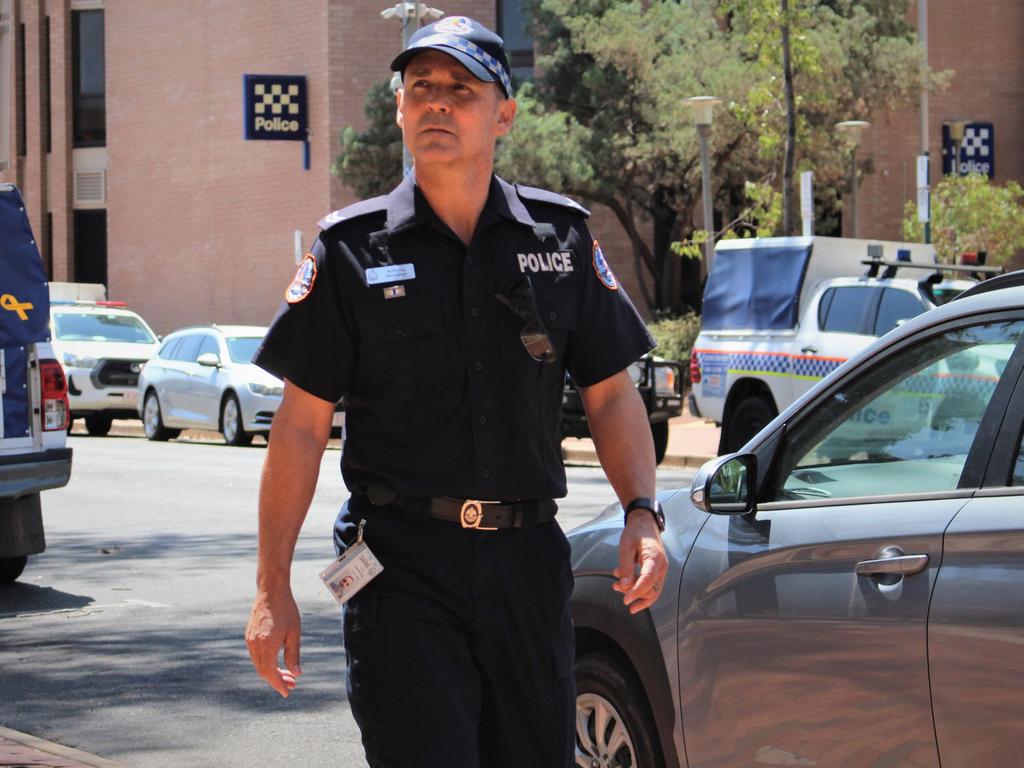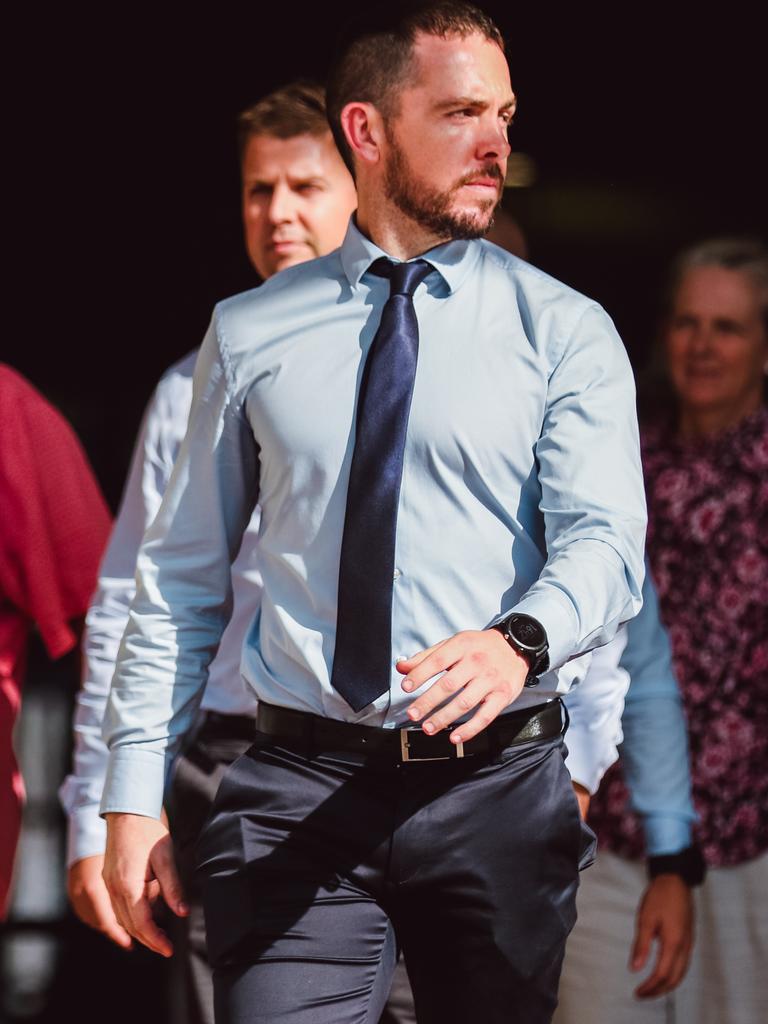The Kumanjayi Walker inquest has been told Zach Rolfe’s text message was a ‘figure of speech’
A colleague says Zach Rolfe did not use excessive force before bragging about having ‘smashed’ a remote Aboriginal community, the inquest into the death of Kumanjayi Walker has heard.
Northern Territory
Don't miss out on the headlines from Northern Territory. Followed categories will be added to My News.
Zach Rolfe did not use excessive force during an arrest in Borroloola almost a year before fatally shooting Kumanjayi Walker, despite later bragging about having “smashed the whole community”, a court has heard.
Constable Rolfe’s specialist Immediate Response Team colleague, Anthony Hawkings, gave evidence at an inquest into the Yuendumu teenager’s 2019 death on Wednesday.
The long-running inquiry began in the Alice Springs Local Court last month after Constable Rolfe was acquitted on all charges over the shooting by a Supreme Court jury in March.
On Wednesday, Senior Constable Hawkings said he was present as a member of the IRT when Constable Rolfe and another officer arrested a man in Borroloola in December 2018.
“As I arrived, I think Constable Rolfe and Constable (Mitch) Hansen may have just arrived as well and they were handcuffing him from what I recall,” he said.
“There was obviously a large crowd of people arriving out of the darkness, probably a little bit excited and I recall him being handcuffed and I think from memory a few members of the crowd wanted to actually have a physical altercation with the person of interest.
“So it was a case of keeping them at bay, I think some person had either punched or tried to punch him after he’d been arrested.”
But Constable Hawkings said simply handcuffing someone was “not generally” considered a reportable use of force and he did not remember any complaints the arrest was too rough.
The court earlier heard after a subsequent deployment to the same community, Constable Rolfe bragged in a text message about having “smashed the whole community” in December.
But when asked by counsel assisting the Coroner, Peggy Dwyer, whether he saw any members of the IRT “smash the community”, Constable Hawkings said “absolutely not”.
“I certainly didn’t, your honour, and I don’t believe that any of the members that were there smashed anything, to be fair, possibly that’s a figure of speech as in we went throughout the community,” he said.
“I can’t say what the intention was behind that comment but there was certainly no smashing of the community in my presence.”
Constable Hawkings said he would not have expected Constable Rolfe to report any use of force because “I did not see any force being used”.
“Had I used any force, I obviously would have submitted one,” he said.

Despite being the member of the IRT armed with an AR-15 assault rifle on the night Mr Walker was shot in Yuendumu, Constable Hawkings agreed that doing so on the Borroloola deployment would not have been appropriate.
“The circumstances, I guess, that was fed to me, probably didn’t lead to a belief there was a requirement to take an AR-15,” he said.
“It may have made people feel apprehensive at the sight of it, particularly if people don’t understand why police had that type of equipment, I can definitely understand that.”
But for the Yuendumu deployment, Constable Hawkings told the court he “made an assumption that nobody else had an AR-15 with them” on the night of the fatal shooting at Yuendumu.
“So I made the decision to take my AR-15, which for IRT is our primary weapon, as opposed to taking your Glock, in the event of the possibility of something extraordinary occurring, where we may have needed it but may not have had it,” he said.
Constable Hawkings agreed with Dr Dwyer, the semiautomatic rifle would not have been of assistance “to do a hands on arrest”.
“But it certainly could in the event if the situation became critical, for whatever purpose,” he said.
“Then at least I was comfortable in the fact that we had all of our relevant accoutrements to deal with any possible situation that may arise.
“The presentation of a firearm, the presentation of any weapons that may cover distance further than a handheld weapon, something to that effect, as an option.”
But Constable Hawkings also agreed that “there wasn’t a whole lot of specific thought that went into who would carry what before you went out to arrest Kumanjayi”, and that it could have been seen as unnecessarily intimidating.
Dr Dwyer asked Constable Hawkings what sort of reputation Constable Rolfe had prior to the shooting and he told her he was known as “a good officer in general”, “enthusiastic” and “hard working”.
But he agreed other text messages, in which Constable Rolfe claimed to have “a licence to towel locals” and the Sergeant in charge of the IRT, Lee Bauwens, used the phrase “bush c***s”, were “highly inappropriate” and “unprofessional”.
Dr Dwyer said if the since disbanded IRT was “ever to be in existence again” it would need the positive qualities attributed to Constable Rolfe as well as being “highly skilled” and “professional”.
“But it’s important, isn’t it, if you have a team like that, that you are absolutely adamant that there will not be any racism in that team, do you agree?” she asked.
“That goes without saying anywhere, to be fair,” Constable Hawkings replied.
“But what was happening in the IRT in 2019 was that police officers, like Constable Rolfe, were using filthy, racist terms about people they were required to serve and protect,” Dr Dwyer said.
“And the Sergeant who was the head of the IRT was using filthy, racist terms in front of young officers?”
Constable Hawkings said: “I agree.”
Earlier, Coroner Elisabeth Armitage ruled the inquest into the death of Kumanjayi Walker would hear evidence of recreational drug use by Constable Rolfe in the lead up to the fatal shooting during a botched arrest in Yuendumu in 2019.
In a ruling handed down on Tuesday, Ms Armitage wrote the “relevant prima facie evidence” was contained in text messages downloaded from Constable Rolfe’s mobile phone during the subsequent murder investigation.
Constable Rolfe was acquitted on all charges by a Supreme Court jury in March.
In arguing for the messages to remain secret, his lawyers had submitted to the inquest that as there was no evidence that he was affected by recreational drugs at the time he shot Mr Walker, there was no logical connection with the inquiry.
But Ms Armitage said there was equally no evidence Constable Rolfe was not affected by drugs or alcohol at the time of the fatal shooting because he was never tested afterwards.
“The public policy served by such testing is obvious,” she said.
“In my view, whether and if so in what way the police force of the Northern Territory ought to have been empowered, or obliged, to test Constable Rolfe for illicit drugs following the shooting of Kumanjayi Walker is a matter relevant to the administration of justice connected with the death.”
Ms Armitage said there was also evidence that Constable Rolfe had recently been prescribed an antidepressant medication “that may also have impacted upon his decision-making” prior to his deployment to Yuendumu.

“Accordingly, the direct outcome of routine drug testing may have been that the police force identified that Constable Rolfe was taking a drug that, in Professor (Andrew) McFarlane’s view, is ‘likely to have impacted on his capacity for behavioural inhibition to threat’.
“An indirect outcome may have been that the police force identified that Constable Rolfe was suffering from a psychiatric condition that is ‘associated with significant difficulties with information processing and threat perception’ and is ‘likely to have impacted upon Constable Rolfe’s capacity to respond in an appropriate and measured way at the time of the attempted arrest’.
“Accordingly, the evidence may prove relevant to my assessment of ‘the cause of death’, or constitute a ‘relevant circumstance connected with the death’, pursuant to section 34 of the Act.”
The inquest continues.
More Coverage
Originally published as The Kumanjayi Walker inquest has been told Zach Rolfe’s text message was a ‘figure of speech’









